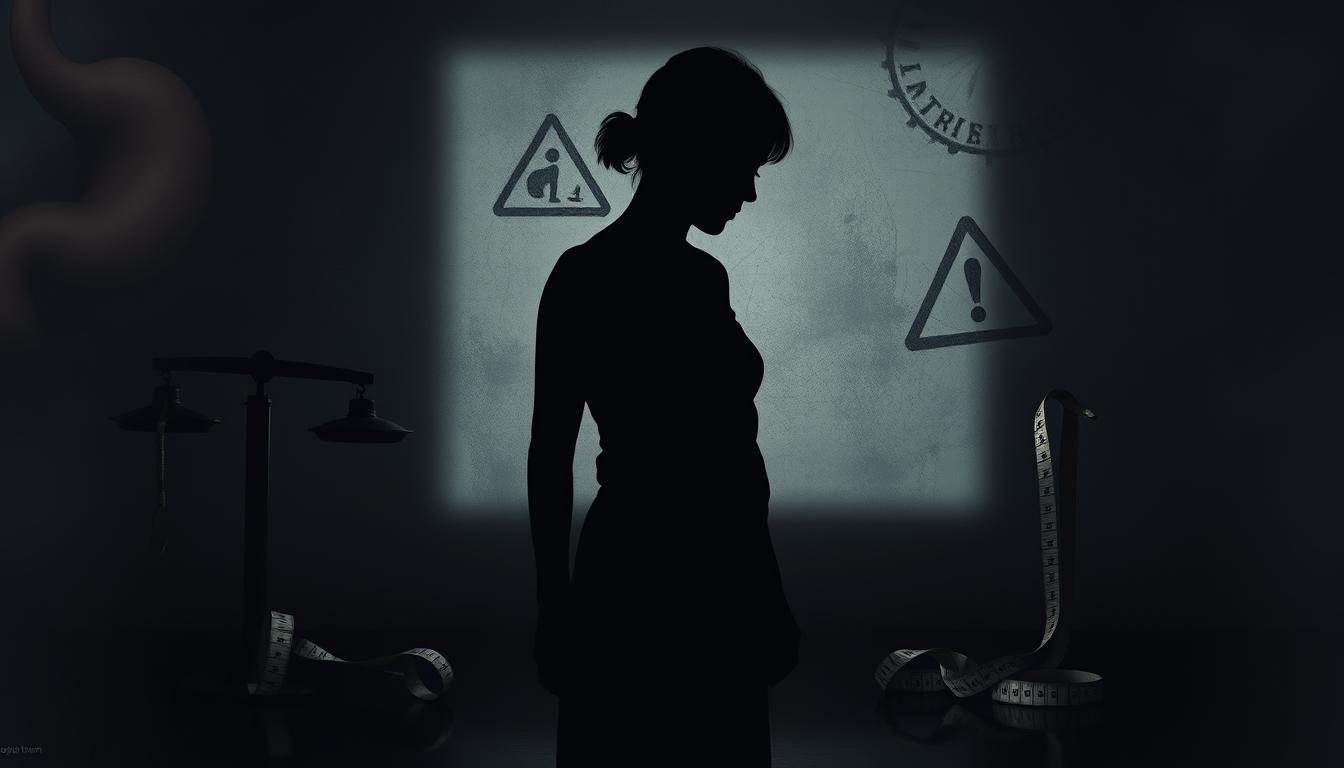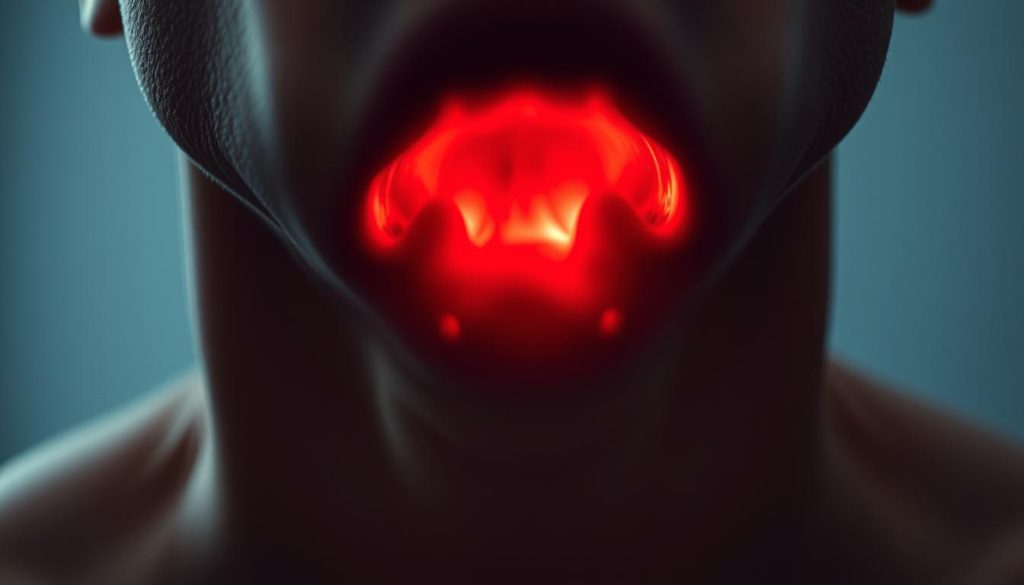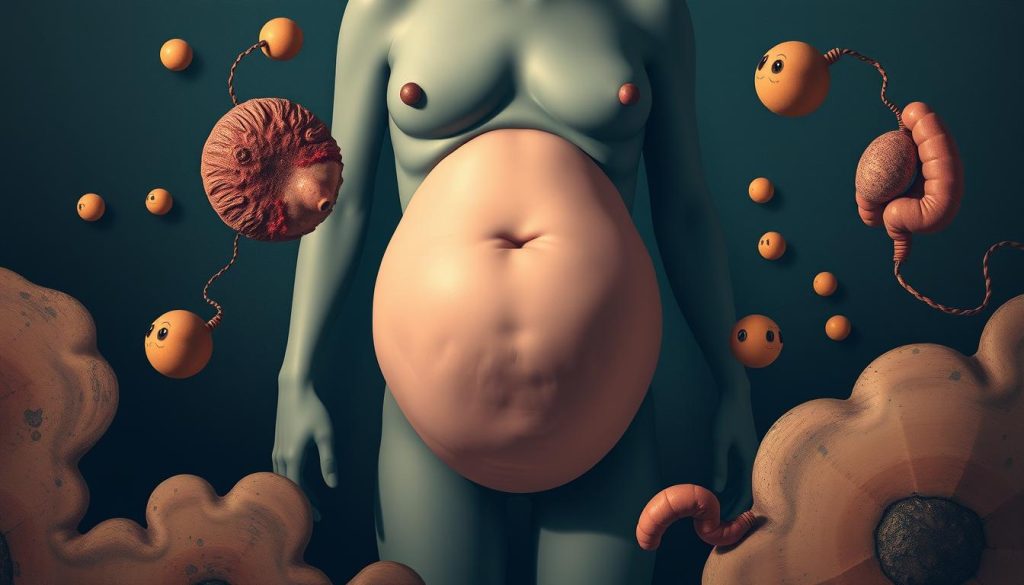Stomach cancer affects thousands of Americans yearly. It often starts with small signs that are easy to miss. Spotting these early symptoms is key for quick diagnosis and treatment.
Abdominal pain and changes in eating habits are signs to watch. These can be early warnings of stomach cancer.
Knowing the signs of stomach cancer helps you act fast. Some symptoms might seem like common digestive issues. But if they don’t go away, it’s time to see a doctor.
By being alert and watching for warning signs, you can catch cancer early. This can lead to better treatment results.
This article will help you understand stomach cancer symptoms. You’ll learn to tell normal digestive issues from serious signs. With this knowledge, you can take care of your health and get the right medical help.
Understanding Stomach Cancer and Its Impact
Stomach cancer is a serious health issue that affects the stomach lining. It impacts thousands of people every year. It’s important to spot stomach tumor symptoms early.
What Defines Stomach Cancer
Stomach cancer starts when cells in the stomach’s lining grow abnormally. These cells can form tumors and spread to other parts of the body. Spotting signs of gastric carcinoma early is key to treatment.
Prevalence and Risk Factors
While stomach cancer rates have dropped in the US, it’s a big issue worldwide. Age, diet, and family history affect your risk. Knowing these factors helps spot who might need more monitoring for symptoms.
| Risk Factor | Impact Level |
|---|---|
| Age (over 50) | High |
| Diet high in smoked foods | Moderate |
| Family history | Significant |
| H. pylori infection | High |
Why Early Detection Matters
Finding stomach cancer early makes a big difference. Early treatment is usually more effective. This shows why it’s important to act fast on symptoms.
Being aware of symptoms and getting medical help is key. Early detection can lead to better treatment and survival rates for stomach cancer patients.
Common Digestive Changes as First Alerts
Stomach cancer often starts with small changes in digestion. Spotting these signs early can help doctors treat it better. Let’s look at some common digestive changes that might mean stomach cancer is starting.
Indigestion that doesn’t go away is a common sign. If you get heartburn or feel uncomfortable after eating often, it’s a red flag. This might feel like a burning or dull ache in your upper belly.
Changes in how you go to the bathroom can also hint at stomach problems. You might see:
- Constipation or diarrhea that lasts longer than a week
- Stools that are unusually dark or contain blood
- Frequent gas or bloating
Feeling full quickly after eating small amounts is another warning sign. If you feel full fast or uncomfortable with normal food portions, it’s something to worry about.
| Digestive Change | Possible Indication | When to Seek Help |
|---|---|---|
| Persistent Indigestion | Stomach Irritation or Ulcers | Lasts more than two weeks |
| Bowel Habit Changes | Colon or Rectal Issues | Persists for over a week |
| Early Satiety | Stomach Tumor Growth | Occurs regularly for several weeks |
Keep in mind, these symptoms can also mean other, less serious issues. If you keep having digestive problems, see your doctor. Catching stomach cancer early is very important for treatment.
Persistent Upper Abdominal Pain and Discomfort
Upper abdominal pain can signal many issues, including stomach neoplasms. It’s key to understand this pain for early diagnosis and treatment.
Characteristics of Cancer-Related Pain
Pain from stomach neoplasms often feels like a dull ache in the upper belly. It doesn’t get better with common pain relievers. This pain might get worse after eating or when you lie down.
Distinguishing from Normal Digestive Pain
Normal belly pain usually goes away in a few hours or days. It’s often caused by certain foods or activities. But, pain from cancer keeps coming back and gets worse over time. It doesn’t get better with passing gas or bowel movements.
When to Be Concerned About Abdominal Pain
See a doctor if you have:
- Pain that lasts more than two weeks
- Severe pain that makes it hard to do daily tasks
- Pain with unexplained weight loss
- Difficulty swallowing or constant nausea
It’s important to know what causes epigastric pain. While many things can cause belly discomfort, persistent or getting worse pain needs a doctor’s check-up. This is to make sure it’s not something serious like stomach cancer.
| Normal Digestive Pain | Cancer-Related Pain |
|---|---|
| Short-term duration | Persistent, worsening over time |
| Often linked to specific triggers | No clear triggers or patterns |
| Relieved by OTC medications | Unresponsive to common remedies |
| Improves with dietary changes | Continues regardless of diet |
Changes in Appetite and Eating Habits
Stomach cancer can cause changes in how much you want to eat and how you eat. These changes might start small but get bigger as the disease grows. People with gastric cancer often lose interest in food or feel full quickly.

Some people start to dislike foods they used to love. This could be a sign of stomach cancer that needs attention. If your eating habits change a lot, see a doctor.
Gastric cancer signs include:
- Feeling satiated quickly
- Unexplained weight loss
- Nausea after meals
- Decreased portion sizes
| Normal Eating Habits | Potential Stomach Cancer Signs |
|---|---|
| Consistent appetite | Sudden loss of appetite |
| Enjoyment of favorite foods | Aversion to previously liked foods |
| Feeling full after a normal-sized meal | Feeling full after eating small amounts |
| Stable weight | Unexplained weight loss |
While these signs can mean other things too, don’t ignore them. Catching stomach cancer early can help with treatment.
Symptoms of Stomach Cancer: Key Warning Signs
Spotting stomach cancer signs early is key for timely treatment. These signs start small but can get worse. Here are the main warning signs of stomach cancer.
Physical Manifestations
Stomach cancer can cause visible changes. You might see swelling in your belly or feel a lump. Some notice yellowing or unusual paleness of the skin.
Digestive System Changes
Your digestive system often shows early signs. You might have trouble swallowing or feel full quickly. Heartburn, nausea, vomiting, or bowel changes are also signs.
Systemic Symptoms
Stomach cancer can affect your whole body. You might lose weight without trying or feel very tired. Fever, night sweats, or feeling unwell are also symptoms.
| Symptom Category | Common Signs | When to Seek Help |
|---|---|---|
| Physical | Abdominal swelling, lumps | If persistent for 2+ weeks |
| Digestive | Difficulty swallowing, nausea | If interfering with daily life |
| Systemic | Weight loss, fatigue | If unexplained and rapid |
If you notice any of these signs, see your doctor. Early detection can lead to better treatment options.
Unexplained Weight Loss and Fatigue
Unexplained weight loss and constant fatigue are often missed signs of abdominal cancer. These signs can be subtle but are very important. They show that something might be wrong with your health.
Weight loss without changing your diet or exercise is a warning sign. Cancer cells use a lot of energy, causing you to lose weight. People with stomach cancer might lose 10 pounds or more without trying.

Fatigue is another common symptom. It’s not just feeling tired after a long day. Cancer-related fatigue is so strong that it doesn’t get better with rest. This tiredness can make it hard to do daily activities and enjoy life.
These symptoms often happen together and can get worse as cancer grows. Finding cancer early is key to better treatment. If you lose weight without trying or feel tired all the time, see your doctor right away.
| Symptom | Normal | Potential Cancer Indicator |
|---|---|---|
| Weight Loss | Gradual, with diet/exercise changes | Rapid, unexplained (10+ lbs) |
| Fatigue | Improves with rest | Persistent, doesn’t improve with rest |
| Duration | Short-term | Ongoing for weeks or months |
Remember, these symptoms don’t always mean cancer. But, they do need medical attention. This is true when you see other signs of stomach cancer.
Gastrointestinal Bleeding Indicators
Gastrointestinal bleeding is a serious sign of stomach neoplasms. It’s important to recognize these symptoms early. This helps in getting a timely diagnosis and treatment for gastrointestinal cancer.
Blood in Stool
Blood in the stool is a scary sign of stomach neoplasms. It can show up as bright red streaks or make your stool look dark and tarry. If you see this, get medical help right away.
Vomiting Blood
Vomiting blood, or hematemesis, is another serious symptom. The blood might be bright red or look like coffee grounds. This means there’s bleeding in the upper digestive tract and you need to see a doctor fast.
Hidden Bleeding Signs
Some bleeding isn’t easy to see. Watch out for these hidden signs:
- Unexplained fatigue
- Pale skin
- Shortness of breath
- Rapid heartbeat
These symptoms might mean you have anemia from slow, chronic blood loss. If you notice any of these, talk to your doctor for a check-up.
| Bleeding Indicator | Description | Action Required |
|---|---|---|
| Blood in Stool | Bright red streaks or dark, tarry stools | Seek immediate medical attention |
| Vomiting Blood | Bright red or coffee-ground appearance | Go to emergency room |
| Hidden Bleeding | Fatigue, pale skin, shortness of breath | Consult doctor for evaluation |
Difficulty Swallowing and Throat Discomfort
Difficulty swallowing, or dysphagia, is a sign of stomach cancer. It makes eating hard. This problem starts small but can get worse.
People with dysphagia might feel like food is stuck. Swallowing liquids can also be tough. Tumors in the stomach can cause these issues.

Throat discomfort is another warning sign. It might feel like a lump or tightness. While not always cancer, it’s important to check it out.
Epigastric pain can have many causes. But with swallowing trouble, it might mean something serious. Remember, these signs don’t always mean cancer, but don’t ignore them.
| Symptom | Description | When to Seek Help |
|---|---|---|
| Dysphagia | Trouble swallowing solids or liquids | If persistent for more than two weeks |
| Throat Discomfort | Feeling of lump or tightness in throat | When accompanied by other digestive issues |
| Epigastric Pain | Pain in upper abdomen area | If severe or lasting more than a few days |
If you have these symptoms, see a doctor. Early detection is key. It can greatly improve treatment chances.
Persistent Nausea and Vomiting Patterns
Persistent nausea and vomiting are common signs of a stomach tumor. These symptoms can greatly affect your daily life. They may also point to a serious health issue.
Frequency and Timing
Nausea from stomach cancer often happens every day. It can last for a long time. Vomiting may occur several times a day, often after meals.
Unlike occasional stomach upset, these symptoms last for weeks or months.
Associated Symptoms
Gastric cancer often comes with other symptoms. These may include:
- Abdominal pain or discomfort
- Loss of appetite
- Feeling full quickly when eating
- Unexplained weight loss
If you have persistent nausea and vomiting with these symptoms, see a doctor right away. Early detection of stomach tumor symptoms can improve treatment outcomes.
| Symptom | Common Cause | Potential Cancer Indicator |
|---|---|---|
| Nausea | Occasional, resolves quickly | Persistent, daily occurrence |
| Vomiting | Infrequent, tied to specific triggers | Frequent, specially after eating |
| Duration | Short-term, days to a week | Prolonged, weeks to months |
Bloating and Feeling Full Quickly
Bloating and feeling full quickly are signs of stomach cancer that shouldn’t be ignored. These symptoms can show up long before other serious signs appear. If you often feel bloated or full after eating a little, it’s time to take notice.

Stomach cancer can change how your stomach works. Tumors can press on the stomach walls, making it smaller. This makes you feel full even after eating a little. Tumors can also trap gas, causing constant bloating.
It’s important to tell normal digestive issues from signs of stomach cancer. Normal bloating happens after big meals, but constant bloating is a worry. Feeling full after a few bites is not normal and needs a doctor’s check.
- Track the frequency of bloating episodes
- Note any changes in eating habits or portion sizes
- Monitor for other abdominal cancer symptoms
If you have ongoing bloating and early satiety, see your doctor. These symptoms are warning signs, even if they don’t mean you definitely have stomach cancer. Catching it early can help a lot with treatment.
Advanced Stage Indicators and Complications
Stomach cancer can get worse and cause more serious symptoms. It’s important to know these signs early to get help fast.
Metastatic Signs
When stomach cancer spreads, it can hit nearby organs. People might feel:
- Jaundice (yellowing of skin and eyes)
- Bone pain or fractures
- Shortness of breath
- Swelling in lymph nodes
This means the cancer has spread, making treatment harder.
Secondary Symptoms
Stomach cancer at a late stage can also cause other problems:
- Severe weight loss and muscle wasting
- Chronic fatigue and weakness
- Bowel obstructions
- Ascites (fluid buildup in the abdomen)
These issues can really affect your life. Finding stomach cancer signs early is vital. If you keep feeling bad, see a doctor right away.
Risk Factors and Genetic Predisposition
Knowing the risk factors for stomach cancer is key to early detection and prevention. Lifestyle choices greatly affect your risk. Smoking, drinking too much alcohol, and eating a lot of salt or processed meats can raise your risk.
Environmental factors also play a part. Exposure to certain chemicals or living in areas with high H. pylori infection rates can increase your risk. These factors contribute to stomach cancer development.
Genetic predisposition is another important factor. Some families carry genes that make them more likely to get stomach cancer. If your relatives have had stomach cancer, your risk might be higher.
Certain inherited conditions, like Lynch syndrome or hereditary diffuse gastric cancer, also raise your risk. These conditions can make you more likely to develop stomach cancer symptoms.
Regular screenings are essential for those at higher risk. These might include endoscopies or imaging tests to find early signs of stomach neoplasms. By knowing your risk factors and working with healthcare providers, you can take steps to prevent and detect stomach cancer early.
FAQ
Q: What are the most common early warning signs of stomach cancer?
A: Early signs of stomach cancer include persistent pain in the upper abdomen and changes in appetite. You might also notice unexplained weight loss, trouble swallowing, and frequent indigestion. Remember, these symptoms can also be from other issues. But if they keep happening, see a doctor.
Q: How does stomach cancer differ from other digestive issues?
A: Stomach cancer symptoms don’t go away and often get worse. Unlike other digestive problems, it causes ongoing pain that doesn’t get better with common meds. You might also lose weight without trying and feel full after eating a little. If you have these signs often, you should talk to a doctor.
Q: Can stomach cancer cause changes in bowel habits?
A: Yes, stomach cancer can change how you go to the bathroom. You might have constipation, diarrhea, or changes in stool color or consistency. Seeing blood in your stool is a big warning sign. It could mean you have bleeding in your stomach.
Q: Is abdominal bloating a sign of stomach cancer?
A: Bloating that doesn’t go away and makes you feel full quickly could be a sign of stomach cancer. While some bloating is normal, if it’s constant and doesn’t get better, see a doctor.
Q: How does stomach cancer affect appetite?
A: Stomach cancer can really mess with your appetite. You might lose your appetite suddenly, start to dislike foods you used to like, or feel full after eating a tiny bit. These changes often lead to unexplained weight loss. Talk to your doctor about these changes.
Q: What are the risk factors for developing stomach cancer?
A: Eating a lot of smoked and salted foods, smoking, being overweight, and having H. pylori infection increase your risk. So does having a family history of stomach cancer. Certain health issues like pernicious anemia and chronic gastritis also raise your risk. Knowing these can help you make choices about your health.
Q: How is stomach cancer diagnosed?
A: Doctors use a physical exam, imaging tests like CT scans, and a biopsy to diagnose stomach cancer. If they think you might have it, they’ll do an upper endoscopy to look at your stomach lining and take tissue samples.
Q: Can stomach cancer be prevented?
A: While you can’t prevent all stomach cancer, making healthy choices can lower your risk. Eat lots of fruits and veggies, avoid processed and smoked foods, don’t smoke, stay at a healthy weight, and treat H. pylori infections. Regular health check-ups and talking to your doctor about any digestive problems are also key.
Q: What is the survival rate for stomach cancer?
A: Survival rates for stomach cancer depend on how early it’s caught. If caught early, the 5-year survival rate is much higher. This shows how important it is to notice symptoms early and get checked out by a doctor.
Q: Are there any specific symptoms of advanced stomach cancer?
A: Advanced stomach cancer can cause severe weight loss, jaundice, fluid buildup in the belly, and bone pain. These signs mean the cancer has spread and need immediate medical care and treatment.


















